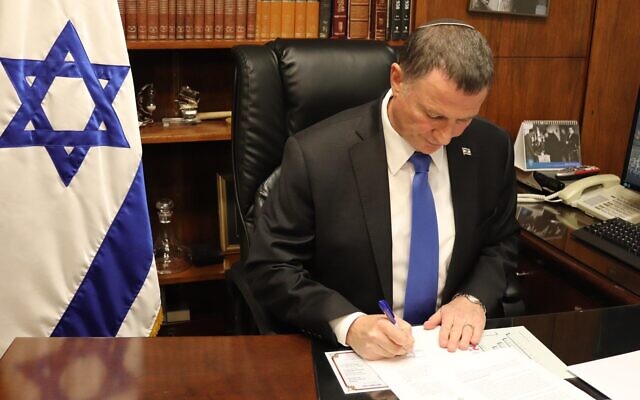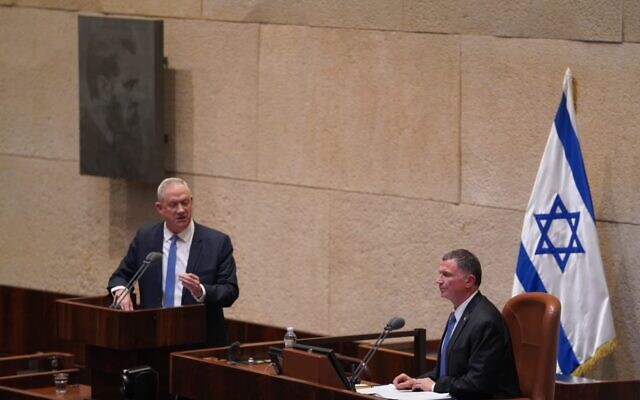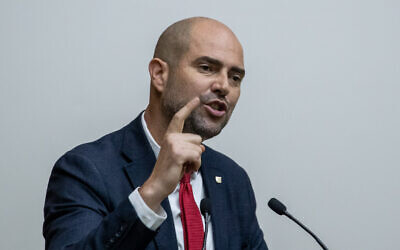Justices issue damning unanimous ruling an hour after Netanyahu ally rebuffs its earlier position; if Edelstein says no again, Israel will be in constitutional crisis

Israel’s top court on Monday night ruled unanimously that the speaker of the Knesset, Yuli Edelstein, must hold a vote by Wednesday to elect a successor. In a devastating ruling, it accused him of undermining democracy by refusing to do so.
The court issued its ruling barely an hour after Edelstein had rebuffed the justices earlier non-binding stance that such a vote must be held.
Were Edelstein, an MK from Prime Minister Benjamin Netanyahu’s Likud party, to again defy the court, Israel would be plunged into a constitutional crisis. Israel’s Justice Minister Amir Ohana, also a Likud MK, earlier Monday intimated that Edelstein should indeed stand firm against the justices.
Edelstein would likely lose his job in the vote, since an alliance of 61 MKs led by Netanyahu’s rival Benny Gantz, head of the Blue and White party, is set to back Gantz loyalist Meir Cohen for the post. Blue and White would then gain control of the parliamentary agenda.
“The continued refusal to allow the Knesset to vote on the election of a permanent speaker is undermining the foundations of the democratic process,” the court’s president, Justice Esther Hayut, wrote in a damning indictment of Edelstein’s behavior.

“It clearly harms the status of the Knesset as an independent authority [while also harming] the process of government transition, the more so as the days pass since the inauguration of the 23rd Knesset.
“Therefore,” she went on, “there is no escaping the conclusion that in the circumstances created, this is one of those exceptional cases where this court is required to intervene to prevent a violation of our parliamentary system.”
The Knesset “is not a cheerleader for the government,” she also wrote, dismissing Edelstein’s argument that the election of a permanent speaker required clarity over the nature of the incoming government. The reverse was true, she noted. “The Knesset is sovereign.”
Gantz was tasked last Monday by President Reuven Rivlin with forming Israel’s next government, after 61 of the 120 MKs backed him for the post. But not all of those 61 — 15 of whom are from the mainly Arab Joint List — would necessarily agree to sit together in a coalition, and thus neither Gantz nor Netanyahu has a clear path to a majority.
Edelstein had informed the panel of five justices earlier Monday night that he did not accept that he must hold a vote on electing a new Knesset speaker by Wednesday.
Instead, Edelstein said he would only schedule a vote “when the political situation becomes clear.”
“I won’t agree to ultimatums,” Edelstein told the court in his official response to the justices’ earlier non-binding position. “I can’t agree because this means that the Knesset’s agenda will be determined by the High Court and not by the Speaker of the Knesset, who is assigned this role.”
Edelstein said that due to the political situation, whereby Blue and White leader Gantz has been tasked with forming a government despite having won fewer seats than the Likud (33-36) and appearing unlikely to be able to muster a coalition, an immediate election of the speaker would be destabilizing.
“A permanent Knesset chairman was never elected at a time when there was such great uncertainty as to the composition of the future coalition,” Edelstein wrote. Furthermore, given the seriousness of the coronavirus crisis, he said, it would be irresponsible to hold a vote now.
“I intend to put the Knesset Speaker’s election on the Knesset’s agenda ‘as soon as possible’, as circumstances warrant, from the next few days until ‘the Knesset convenes for the establishment of the government,’ Edelstein said, quoting the law which gives him significant leeway in deciding when to hold the vote.
“Due to the special circumstances, at this stage I find it difficult to specify an exact date, but I intend to place the issue on the Knesset’s agenda when the political situation becomes clear. Hopefully this will happen in the shortest possible time,” the Knesset speaker told the High Court.


On Monday morning, the court, responding to a petition filed by Blue and White, had indicated that Edelstein should schedule the vote, citing the Knesset’s legal adviser’s position that a vote for speaker should be held shortly, and the attorney general’s position that a vote for speaker should be held as soon as possible. It gave Edelstein until 9p.m. Monday to respond.
Edelstein set off a firestorm of criticism last Wednesday after he refused to allow the Knesset plenum to convene to vote both on establishing the Arrangements Committee and electing a new speaker. Edelstein at first argued the freeze was linked to safety precautions amid the coronavirus outbreak, but later explained it was meant to force Likud and Blue and White to compromise in unity talks.
Critics said it amounted to an illegal shuttering of parliament by Likud in order to improve the party’s leverage in the coalition talks, and some argued that it constituted part of an attempted political coup, with a parliamentary majority headed by Gantz prevented from assuming control of the Knesset’s agenda.
With Edelstein’s proposed ouster, Blue and White, which has the support of 61 of the Knesset’s 120 lawmakers, is looking to gain control over parliament, in part to oversee the government’s handling of the COVID-19 pandemic. Blue and White is also seeking to advance legislation that would bar a Knesset member facing criminal charges from forming a government, effectively disqualifying Netanyahu.
“This court does not exercise its authority in such a case but in special cases where there is a concern about harming the fabric of democratic life,” Edelstein wrote, adding that, “Postponing the date of the election of the chairman will not hurt the foundations of Israeli democracy, but the contrary.”

Tourism Minister Yariv Levin (Likud), a close ally of Netanyahu who also plays a central role in coalition negotiations, condemned the High Court earlier on Monday, and urged Edelstein to defy the justices.
“The court has officially taken control of the Knesset, and from today, the High Court has turned the Knesset speaker into a rubber stamp as the Knesset and plenary are being managed by the justices,” said Levin. “There’s nothing like this in any democracy. I urge the Knesset speaker to announce that only he will determine when the plenary convenes and what its agenda shall be.”
Justice Minister Ohana tweeted a photo of the court’s stated position from earlier in the day, which said Edelstein must inform the justices on whether he would proceed with a vote on his replacement. Above it, wrote Ohana: “If I were the Knesset speaker, my answer would be no.”
As reported by The Times of Israel
